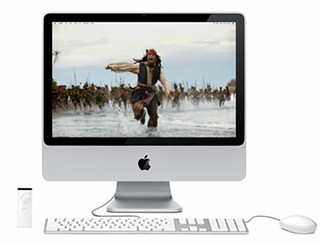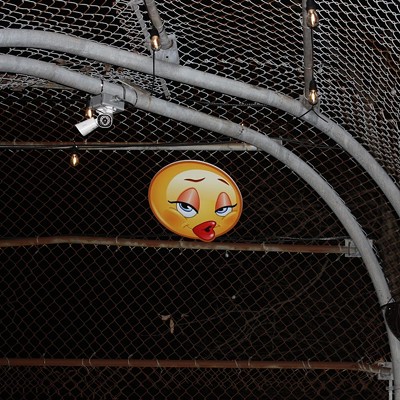Music fell because it was destined to.
And until the digital age, the format wasn't the point. Records were released on vinyl first, which morphed to a clunky version of the cassette, the 8-track, which was eliminated completely upon the popularization of tapes, which are now novelty items in a sea of CDs. (Before Sam's unceremoniously closed its Barrington Street doors this year, you could buy what was left of its tape stock for 50 cents a pop.)
The CD was a marvel—durable, better sounding, wide enough to make album art worth looking at again. There was no waiting to rewind, getting up to flip the record over. Labels reissued albums that had been available in vinyl and tape form, and people bought them all over again. (In the more recent, most desperate years, major labels have been fond of releasing a standard version along with a "deluxe," more expensive version of the same record, including something like a 20-minute promotional DVD or a couple of extra tracks.) And though a single disc costs less than a grande Frappuccino to manufacture, the same record could fetch between 10 and 25 bucks at the register. Labels settled into their money piles, drinking venti Frappuccinos, no doubt, and laughed.
Then came the mp3. And the death rattle: peer-to-peer sharing. A torrent of tears began pooling all around the world as record sales dropped and the money-scented fog began to clear around the pile of unnecessary A&R reps at the major labels. Jobs were lost. Labels were merged. Purse strings were tightened. And still the CD fell.
A June 28 story in Rolling Stone, headlined "The record industry's slow fade," marks D-day for the labels as July 15, 2000, when major label executives gathered at a hotel and attempted to strike a deal with the CEO of Napster, Hank Barry, to create a pay subscription service. Due to pressure from artists—who needed the revenue from Wal-Mart—and retailers—who weren't keen on CDs being available cheaper online—the parties couldn't reach a settlement.
"Even worse," Stone scribes Brian Hiatt and Evan Serpick write, "the record companies waited almost two years after Napster's July 2nd, 2001 shutdown before licensing a user-friendly legal alternative to unauthorized file-sharing services: Apple's iTunes music store, which launched in the spring of 2003. ..."That's when we lost the users,' said Hilary Rosen, who was the then-CEO of the Recording Industry Association of America, of CD buyers. "Peer-to-peer took hold. That's when we went from music having real value in people's minds to having no economic value, just emotional value.'"
And emotional value doesn't keep Justin Timberlake's private jet fueled. But despite efforts like targeting poor college kids in million-dollar illegal downloading lawsuits to force CD-buying, and decimating record label staffs and jacking up concert ticket prices to try and make up the losses, CD sales continue to drop. And the record industry must pay, in people and slower cars and vacation homes, for not respecting its audience enough to realize that it would adapt to new technology as it had those other times, when the industry reaped the benefits by being able to repackage and resell titles every time the format changed.
To be fair, this change came the quickest of all.
"I'm a very IT-oriented dude, and I didn't see it either," says Halifax lawyer and music scene vet Chip Sutherland, who represents Feist and Sloan and ran Perimeter Records. "The file-sharing concept happened within 18 months. It was like getting an extremely virulent flu. That's when I started to re-tool everything." He shuttered his CD distribution company Tidemark when he saw the mp3 was winning. "I was like, "Boys, we are in the buggy whip business, and the motorcar just arrived. And nobody needs buggy whips anymore.'"
Similarly, music's big sister, the movie industry, has experienced a number of format changes itself, most importantly VHS to DVD. (The DVD market is so huge, it has eclipsed the cinema in profit.) And the audience has been adapting, too. In the early days of movie downloading, only the biggest nerds with the fastest connections and most memory would bother investing the time it took to download an Asian bootleg, or a Jenna Jameson feature, or a new release usually camcorded in a theatre—you would start your download at night, and wake up to it finishing in the morning, fingers crossed that it didn't conk out at 92 percent completed.
But as high-speed became the norm, more people started digitizing films and creating torrents of them, leaving old-school download services like Limewire in the dust. As peer-to-peer sites like BitTorrent took hold—instead of downloading directly from one person, and losing that connection when that person goes offline, you're connected to a whole system of people with the same file—suddenly downloading films was something anybody could do, easily and in an acceptable timeframe.
"The only difference between the music business and the movie business is bandwidth," says Sutherland. "They only thing that saved them was that their file size is 115 times larger than a record."
While it's true you can get a two-hour movie, about 700 megabytes of data, in a few hours, you can get an album, about 50 megs, in minutes. Sutherland notes that because it took so long to get high-speed internet to all parts of the US, 10 times Canada's population, it bought the movie industry some time.
"America's so big that it took forever for them to build the infrastructure for everyone to have high speed," he says. "We're more spread out, but our population is more concentrated. Obviously they're caught up now. With compression and bandwidth getting faster, you're gonna have the exact same problem." Now that the US is all wired up and technology is continuing to evolve, the scene is set for movies to run into the same problem as music.
While the American box office is up eight percent over this time last year, the movie industry has been pushing its anti-piracy agenda, recently sending governor Schwarzenegger up here to push Stephen Harper into committing Canada, which Warner Brothers has declared as a huge source of camcorder files, to its fight. The Motion Picture Association of America and the major film studios have donated a lot of wasted time and energy (and in the case of the MPAA, one unfortunate series of ads) toward shutting down torrent sites, searching journalists and film festival audiences for video cameras and threatening lawsuits against up- and downloaders in an attempt to stop a problem that, from a financial perspective, does not even appear to be hurting them. If the music industry died on July 15, 2000, D-day for the movie industry —like a teaser ad for the next Pixar release, so far in the distance it's almost pointless to bring it up—seems safely, but inevitably, in the unseen future.
So if music, that great lumbering decadent beast, could fall, can the movie industry, the greatest, most lumbering, most decadent beast of all, do what music did not—respect the audience's relationship to technology, and utilize it to its own advantage? Can it find a way to make money instead of losing it? Can it look to the failures of its sister industry and avoid those mistakes?
Can Hollywood learn the lesson in time?
From Variety, July 22, 2003:
The Motion Picture Assn. of America has thrown the full weight of the seven major studios and the nets they own behind its strongest and most public anti-piracy campaign to date. Enlisting the help of its powerful media holdings and allies—35 networks and cable outlets and 5,000 theaters—the MPAA will launch a series of public service announcements on primetime TV Thursday and on thousands of movie screens across the country starting Friday.
"This is the most comprehensive and unified program we've ever embarked on," MPAA prexy Jack Valenti said Tuesday. "These usually antagonistic companies all came together on this. ...Every company had a piece of this."
Studios want to jump on the digital piracy issue before speedy Internet connections make movie file-swapping as easy as ripping off music online. Right now, the MPAA estimates traditional piracy alone has inflicted a $4 billion loss.
The campaign, Movies—They're Worth It, featured below-the-line industry people, like make-up artists, set designers and grips, talking about how downloading movies affected their lives. The ads attempted to undercut the class rage Jill Moviegoer feels against actors who make $20 million for three months' work—it wouldn't hurt Tom Cruise or David Geffen, of course, but look how you're hurting me, Mr. Schmo Cable-Hauler with a Family.
Jack Valenti, who created the much-maligned film ratings system (Roger Ebert is its most prominent hater) America has used since 1968—boobs mean R, decapitation is a light PG-13!—was a diligent pro-copyright lobbyist throughout his nearly four decades in the movie business. It was Valenti who sounded the death knell upon the introduction of the VCR—a good reason not to listen to him 20 years later—and who in 2003 introduced a ban on screeners, the DVDs sent to awards nomination committees, which are important especially for smaller films and less-popular television shows. A court injunction forced him to reverse this decision. He retired in 2004 and died in April, leaving a legacy of knee-jerk reaction and misplaced moral outrage deeply entrenched.
Back in 2003, the MPAA also launched a website, respectcopyrights.org, a garish mesh of circles that flash intermittently. (It hasn't been updated since November of 2006.) Under "So What's it to me?" the wannabe-ominous message reads: "If you use peer-to-peer file-sharing services, you are almost certainly exposing your computer to harmful viruses, worms, Trojan horses and annoying pop-ups, and you are inviting strangers to access your personal information." So it's the internet that's out to get you, not us! Oh, wait: "That makes it pretty easy for law enforcement to track you as well."
Right. It goes on to remind you about the ordinary people you're stealing from, and even implies that you are potentially reducing studio output, such will the loss be from your thoughtless, dangerous downloading.
But watching movies on your computer sucks. It takes hours to download, it hurts your lap, it hurts your arm, playback can be choppy, files are misnamed, the quality varies wildly. If it's a CAM video—as in somebody went into a movie with a video camera and filmed the movie, the equivalent of putting a boom box up to the TV to tape a video from MuchMusic—the result is uniformly atrocious. Nobody prefers this option. (Sometimes it's all you've got—I've seen banned movies like Ken Park, which got distro in Australia but not the US, and Don's Plum, a mid-'90s indie quashed by embarrassed stars Leonardo DiCaprio and Tobey Maguire, via download; I'm not going to track down some crap 17th generation tape when there's a perfectly viewable digital copy on some website in Germany.)
Assholes will always steal things. They tape songs off the radio, they record television shows, they borrow CDs and burn them.
Don't worry about them. They don't care about art, and they'll consume it superficially, and they're exactly the audience who will go see your $200-million action franchise or anything with Will Ferrell in it. You don't need to threaten them. (You also don't need to market to them—you could save millions in advertising dollars by just buying banner ads on MySpace or Facebook.)
Because people will always want art. The tentpole movies, the Event Films that drop all throughout summer and at Christmastime —those don't need much more than a trailer here and there. Popcorn movies sell themselves. If studios took the money they waste on cross-platform promotion and marketing budgets and put it toward promoting their niche/indie/foreign films, they would do better. Film snobs and action fans are the same —we all go to the films we like. The key is in the crossover, not the cross-promotion. Promote tinier films and more people will see them, while still paying for the big mainstream films they were going to go see anyway. Everyone wins—studios make more money, smaller films reach a wider audience, thereby raising awareness of their actors, writers and directors for the future, thereby ensuring more money for the studios.
"Your best economic model is don't give the money to seven record labels—they have a belief, honestly held, that if we load up 10 Canadian companies with money they'll create an economy," says Sutherland, speaking to the way the Canadian government funds music in this country. "No, they line their pockets. Because they're human and that's what humans do. If you give that same money to 50 artists you're gonna get 25 hits."
Though he reiterates of the movie business that "it's just size and compression that's kept it from being the music business. It's just size. They're on a ticking time bomb," he thinks Hollywood will survive because it's had more time to breathe.
David Clark agrees. He's a filmmaker, artist and a professor in the film department at NSCADU. "The studio system has a lot invested in its marketing and production," he says, "they're vertically integrated structures. It's been eaten away more gradually. What happened in the '60s and '70s"—the Easy Riders, Raging Bulls era—"and the development of independent film in the '90s meant the industry had to radically change its studio system. It's pretty adaptable."
Jack Valenti started wheezing about the internet back in 1998, so if you have to give the man credit for anything, at least he paid attention. In recent years we've been hearing about how the box office is down —it turned back up last year—but movies are also costing much more these days: the average studio film cost $100 million—$34 million of that in marketing—in 2006. (All figures in US dollars. But whatever the currency, imagine how many independent films could be made for one studio film's marketing budget.)
Titanic was a huge joke in Hollywood in 1996, until it took mere months to become one of the highest-grossing films of all time. That $200-million budget is no longer an unheard-of number—2005's crime hijinks remake of Fun with Dick and Jane, starring Jim Carrey and Tea Leoni, cost over $100 million. For a comedy. June's Evan Almighty hit $175 million. Almighty has made back about a third of its budget, while Dick and Jane somehow broke even Stateside. (In contrast, all three Pirates of the Caribbeans cost between $200 and $300 million to make, and have collectively grossed almost $3 billion. They got worse with each installment, but people kept going. See what we mean about marketing? High concepts are easy.)
Meanwhile, this year's breakout Sundance hit Once, a tiny Irish musical with no stars, cost $175,000 and has made $6.5 million to date, so successful that its distributor, Fox Searchlight, is refocusing and relaunching a new advertising campaign, for a film that's been out, often in the top 20 earners, since May. Nothing blows up, there are no special effects—there are barely lights—and the couple doesn't even kiss. But it's a perfectly wrought love story, full of heart and terrific music. It was made by people with something to say, people who cared—it wasn't about the bottom line and how many millions in profit the studio received by the end of its run.
"There are two very different kinds of cinema going on," says Clark. "There's cinema as a theme park—everything's tied in. Kids' films now, it's not a movie anymore, the movie is only a small part of a massive, multi-faceted campaign to brand as many products as they can and sweep people up. You'll continue to have that kind of industry. And that kind of industry has more to lose over protecting their property. And they're pretty vicious about that. But there's a whole other kind of filmmaking happening."
And that filmmaking is of the digital, experimental, self-distributed kind, borne of home video and coming of age now, within the YouTube generation.
He offers up radio as an example of an early information-sharing system, adding that "telephone is the ultimate peer-to-peer system." What technologies are developed for and what they're ultimately used for—the internet, remember, was initially a confidential communications network for the US government—are often disparate.
"It's not the technological changes that are significant," Clark says, "it's the social use of technology."
Initially a sculpture artist, Clark moved into short and feature filmmaking, and "got on board the multimedia thing when CD-ROMs were around," inevitably ending up on the internet. His website A is for Apple (aisforapple.net) is an intense, intricate, interactive study of the links between image and information, full of gorgeous Flash animation. It—a website, remember—travelled the film festival circuit in 2003.
"When I did A is for Apple, people were interested because it was new, it was free, it was on the internet," he says. "I got invited to documentary festivals, Sundance, places you wouldn't think new media or art would be looked at. I've found that people are very hungry. There's an audience unfiltered by a commercial interest in stuff.
"Since then I've been trying to negotiate this film language I have with the internet and the possibilities of people finding it. The whole film distribution system is set up as a flash in the pan—you have three months to make it on the festival circuit and one year in theatres," he says.
But there is no "circuit" on the internet—once it's up, it's up, waiting to be found through endless link clickage, email word-of-mouth, blog tags and real, live communication. It's obviously a positive thing for artists distributing their work exclusively through the internet, and a futile situation for those who don't. For every torrent site or mp3 blog that gets shut down for a few days, the files are in transit and immediately available somewhere else.
Music is more disposable because of the sheer volume of it, and its portability makes it a personal experience that can adapt to any situation—plane ride, long walk, workout, commute, house work. But a film is different. Where listening to music can be a passive action—the lyrics aren't sticking, you missed that guitar solo, so what if ProTools is singing for this girl —film requires action. You must pay attention, for a finite amount of time. It's not music—you can't walk to work and watch a movie.
The digital age has forced industries to react more quickly than they've ever had to before, and they stumbled out of the gate, and music paid dearly. Record execs couldn't see, or at least weren't looking at, how digital songs would change their business, even though they adapted to 8-tracks, then tapes, then CDs. It's understandable that the film industry is freaking, even though there isn't really sufficient evidence that profits are taking a hit.
Chip Sutherland believes people will pay for legal downloads once Hollywood can figure it out. "In terms of the money that's out there, there are people willing to pay," he says. "It's a price point issue—when you look at what people pay for their cell phones; airtime, ringtones, it's just ridiculous." With movies, "It's just the price point's been off and people know it."
But the days of having movie-theatre-equivalent rooms in our homes are far from here, no matter how many inches your plasma is. People will always want the night out. They will always want to leave their houses. They will always need somewhere to go for a date. They will always, it seems, pay ridiculous prices for theatre food. They will always want Dolby and the giant screen and the comfortable stadium seat.
Head out to Empire's compound in the BLIP any Friday of the year and you can tell. Join the line that's out the door. Twenty minutes later, when you've watched shows sell out and decided for the third time what to go see based on what's left, ask, as I did once on a non-blockbuster week, what people were there to see.
"Doesn't matter," the kid at the register shrugged. "It's like this every Friday."
For now. Someday the pendulum will swing toward—and stick at—home viewing, once the studio heads can get in a room and accomplish what the label heads could not—agree on how to make digital downloads legal and profitable. They will find a reasonable price. People will pay it. Attendance will drop at movie theatres, but they'll remain open—while jacking up concession prices, no doubt —and the profit losses will be taken care of by the people watching the exact same films in their living rooms.
"A certain kind of filmmaking will definitely want to curtail the distribution and downloading of movies," says Clark. "But how can it? The cat is out of the bag. And the expectation of the audience is that you can get the stuff. They're just gonna have to deal with it. There's not going to be a global regime of regulation that's going to shut it down."
Coast arts editor Tara Thorne grew up in a country town without a movie theatre, which may be why she loves the cinema experience so very much. She might have a recurring arm tingle from watching too much downloaded TV on her laptop, but she still goes to the movies about once a week. She will never pay to have current releases beamed into her 27-inch Sylvania television, so don’t even bring it up.

















